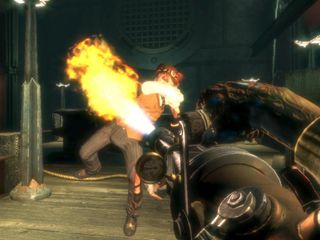Intel snaps up physics simulation tech
Havok physics engine acquisition part of Intel gaming plan?

As the IDF tech fest prepares to go into overdrive today, Intel has announced plans to acquire physics simulation specialist Havok.
Havok is probably the biggest noise in digital physics simulation today. Its software physics engine is used by a wide range of leading PC and console game titles including BioShock, Half-Life 2 and Oblivion. The company's technology is also used by digital animators in film production.
For now, Intel is being coy about exactly how the Havok acquisition will tie into its future product plans. Intel's Renee J. James was only willing to reveal that Havok, "will become a key element of Intel's visual computing and graphics efforts".
Larrabee
However, the acquisition ties in nicely with Intel's plans to release a new gaming-centric graphics and physics acceleration chip, known as Larrabee. Due out in 2009, Larrabee is a new multi-core processor that majors on floating-point processing power.
That's precisely the sort of chip design required for high performance hardware physics acceleration. Indeed, the only dedicated physics processing chip currently available, Ageia's PhysX processor, sports a similar configuration.
Of course, Intel won't just be competing with Ageia. Both AMD and Nvidia have also announced initiatives which leverage their existing graphics architectures to accelerate physics. As yet, however, we've yet to see any hard product.
We'll be keeping our scanners peeled at IDF this week for any further news regarding both the Havok purchase and the much anticipated Larrabee chip. Not to mention a whole heap of announcements related to Intel's upcoming 45nm processors...
Get daily insight, inspiration and deals in your inbox
Get the hottest deals available in your inbox plus news, reviews, opinion, analysis and more from the TechRadar team.
Technology and cars. Increasingly the twain shall meet. Which is handy, because Jeremy (Twitter) is addicted to both. Long-time tech journalist, former editor of iCar magazine and incumbent car guru for T3 magazine, Jeremy reckons in-car technology is about to go thermonuclear. No, not exploding cars. That would be silly. And dangerous. But rather an explosive period of unprecedented innovation. Enjoy the ride.
